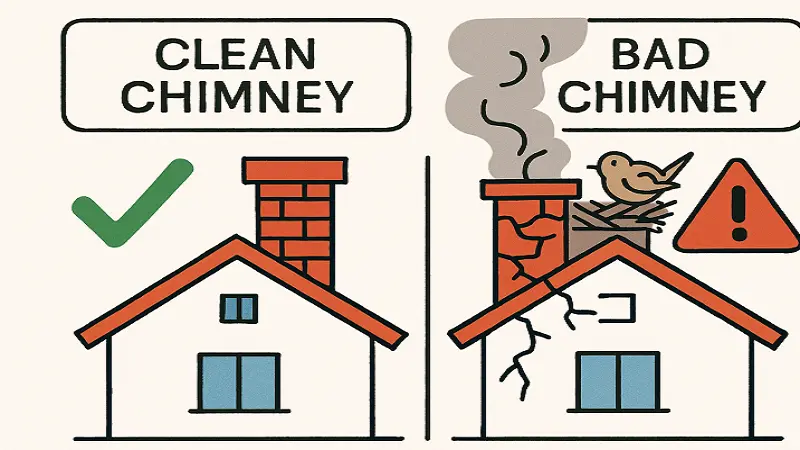Key Takeaways
- Annual chimney inspections play a vital role in preventing fires and ensuring structural safety.
- Regular professional inspections can increase the energy efficiency of your home and reduce long-term repair costs.
- Documentation from inspections helps with insurance compliance and coverage protection.
- Wildlife, debris, and creosote buildup are common issues best handled by professionals.
- Chimney maintenance not only protects your household but also extends the lifespan of your home’s heating system.
Table of Contents
- Chimney Inspections and Home Safety
- Protecting Your Chimney’s Structural Integrity
- Improving Heating Efficiency and Indoor Air Quality
- Detecting Wildlife and Debris
- Meeting Insurance Requirements
- Extending Chimney Lifespan
- Conclusion
Chimney Inspections and Home Safety
Regular chimney inspections are a crucial part of maintaining a safe and healthy home. Over time, chimneys can accumulate creosote, soot, and debris, which increase the risk of fires and block proper ventilation. Cracks or structural damage may also develop, allowing dangerous gases like carbon monoxide to seep into living spaces. By scheduling routine inspections, homeowners can identify potential hazards early, ensuring their fireplace operates efficiently while protecting their family and property.
Selecting a reputable professional is crucial for obtaining thorough and reliable evaluations. An experienced team, such as an Atlanta chimney company, can assess the condition of your chimney, clean buildup, and recommend necessary repairs. Regular maintenance not only enhances safety but also prolongs the life of your chimney, providing peace of mind and efficient heating in your home.
Protecting Your Chimney’s Structural Integrity
Your chimney, exposed to the elements, faces risks like cracks, spalling bricks, and deteriorating mortar due to weather changes. Regular professional inspections can detect issues such as damaged flue liners or water leaks early, preventing costly repairs. Ignoring these problems can compromise safety and efficiency, as damage may allow fire or gases to escape. Early repairs help homeowners avoid expensive restorations, which can often be achieved through regular maintenance. Structural issues may also lead to water infiltration, causing mold and interior damage. Since moisture is a significant threat to masonry chimneys, annual inspections act as preventive measures to safeguard your investment and prevent hidden water issues.
Improving Heating Efficiency and Indoor Air Quality
Efficient heating appliances rely on unobstructed airflow through the chimney flue. Blockages, such as nests, leaves, or soot buildup, restrict ventilation and lead to poor fuel combustion, resulting in increased smoke and potentially harmful emissions inside the home. Regular inspections and cleaning optimize your fireplace or stove’s output, ensuring each fire burns cleaner and more efficiently—which translates to less wood burned and lower heating costs.
Additionally, consistent care helps maintain excellent indoor air quality by venting smoke and carbon monoxide outside, rather than allowing it to seep into your living spaces. Properly monitored chimneys support draft performance, preventing backdrafts and making your home more comfortable and safer throughout the winter.
Detecting Wildlife and Debris
Chimneys provide a warm, protected environment that attracts animals such as birds, squirrels, and raccoons. These unwanted guests can cause obstructions, creating fire hazards or forcing smoke and fumes back into your home. Professional inspections not only clear out debris and nests but also assess your chimney’s cap and screen to deter future wildlife intrusions. Addressing these issues promptly also reduces the risk of disease and costly chimney repairs down the line.
Meeting Insurance Requirements
Insurance providers often require documentation of chimney maintenance to cover claims related to chimney and heating system fires, as well as water damage. If you can’t prove regular inspections, your claim may be denied following a chimney incident. Maintaining annual records confirms that your property is in compliance with current codes, which protects your policy and provides peace of mind. It’s also a smart move if you plan to sell your home, as prospective buyers will appreciate the added proof of responsible homeownership.
Extending Chimney Lifespan
Just as with any other central home system, ample care and routine inspections can significantly extend the life of your chimney. These inspections allow minor issues to be addressed before they turn into significant, expensive problems. Professional sweeps can recommend the best types of fuel for your system and offer guidance on regular in-between cleaning. Following these expert suggestions ensures your chimney remains in prime condition for many years.
Conclusion
Regular, professional chimney inspections are a crucial aspect of responsible homeownership. In addition to preventing fire hazards and costly damage, they ensure proper ventilation, enhance heating efficiency, and bolster insurance compliance. Investing in these inspections not only keeps your household safer but also saves you money and extends the service life of your chimney and heating system. Schedule an annual checkup with a trusted professional to keep your home warm, efficient, and protected throughout the year.
